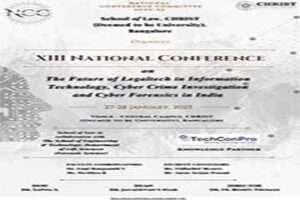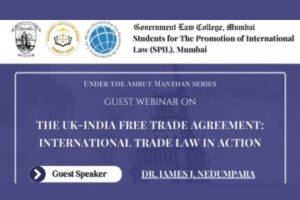International seminar on Combating Violence against Women and Children: Causes and Consequences by KLA
Kerala Law Academy Law College invites submissions for its 24th International Seminar on Combating Violence against Women and Children: Causes and Consequences on 25th of January, 2025.
About the Organization
The Kerala Law Academy Law College (KLA), established in 1966 is a Centre for legal studies, legal research, and law reforms. Its acclaimed peer-reviewed Research Journal has been published continuously since 1977.
The College, affiliated with the University of Kerala, offers Undergraduate programs in BA LL.B. and B. Com LL.B. five-year integrated courses, LLB Unitary three-year course, and post-graduate courses of LL.M (Administrative Law), LL.M (International Law) and MBL (Master of Business Law).
About the Seminar
The Kerala Law Academy Law College in association with the Centre for Advanced Legal Studies and Research (CALSAR) and IQAC KLA is organizing a One Day International Seminar on the “Combating Violence against Women and Children : Causes and Consequences” 25th of January, 2025 from the Kerala Law Academy Campus, Peroorkada, Thiruvananthapuram, Kerala.
Call for Papers
The Organizing Committee of the Kerala Law Academy Law College is calling for Research Articles from Law Students, Academicians, Lawyers, Social Workers, Policy Makers, and Officials from various Departments- Representatives from Institutions and professional; NGOs, IPR Professionals, Technical Researchers, and Faculty and Research Scholars.
A major societal issue, violence against women and children has consequences for society at many levels. Everyone is at risk from violence, but women and children are especially vulnerable because they frequently lack the necessary protections or have less rights. Certain forms of violence are considered socially or legally acceptable in some communities, which increases the risk to women and children. Research over the last ten years has shown that this type of violence is becoming more widespread, but there are still data gaps.
Victims of any kind of violence are sometimes reluctant to report crimes because they fear social censure or stigmatization. The problem is made worse for women and children since the offenders are frequently people they know, and some nations do not have laws or policies that protect victims. According to some of the data gathered, violence against women can vary from 15 to 71 percent in some nations, while violence against children can reach 80 percent. These statistics show that violence against women and children is widespread and has a significant negative impact on world health.
Preventing Violence against Women and Children focuses on these elements of the cycle as they relate to interrupting this transmission of violence. Intervention strategies include preventing violence before it starts as well as preventing recurrence, preventing adverse effects (such as trauma or the consequences of trauma), and preventing the spread of violence to the next generation or social level. Successful strategies consider the context of the violence, such as family, school, community, national, or regional settings, in order to determine the best programs.
This seminar aims to conduct discussions among legal luminaries, academicians, scientists, industrialists, environmentalists, and other stakeholders. The seminar seeks to distillate the various suggestions and experiences of diverse experts to ensure a fruitful proceeding of the seminar.
Moreover, this International seminar provides a premier interdisciplinary platform for researchers, practitioners, and educators to present and discuss the most recent trends and concerns as well as challenges encountered and solutions under the topic of discussion.
Mode
The seminar is conducted through the online platform ZOOM. All the participants should have good access to the internet and be able to access the above said online platform.
Sub-Themes
1. Eve-teasing, Molestation, Sexual Abuse and Rape
2. Forced Prostitution and Trafficking of Woman and the Girl Child
3. Sexual Harassment and Abuse at the Workplace
4. Domestic Violence and Honour Based Violence
5. Image of Women in the Media
6. Violence Against Women and child and Human Rights Issue and Challenges
7. Familial Violence (Domestic Violence, Cruelty and Harassment Related to Dowry, Dowry Death)
8. Wars/Conflicts: Women Target of Violence
9. Intimate partner violence (battery, psychological abuse, rape, marital rape)
10. Global Scenario of Violence Against Women and International Efforts to Eliminate Violence Against Women
11. Female feticide, infanticide, Acid Attacks and Cyber Crimes
12. Cyber-Crime against Women.
13. Domestic Violence : National & International Framework.
14. Provisions relating to Women and Children under the Constitution of India & the Role of Judiciary.
15. Reproductive & Marital Rights of Women.
16. Challenges & Problems in Women Empowerment in India.
17. Social and Political Dimensions of the Issue of Women Empowerment in India.
18. Child in Cyber World- Pornography
19. Infanticide and Feoticide
20. Rights of a Child
21. Historical aspects of child rights
22. Child Rights Governance
23. Monitoring and Implementation of Child Rights
24. Violation Of Child Rights within a family
25. Mechanisms for the protection of child Rights
26. Role of Judiciary in protecting Child Rights
27. Governmental role in safeguarding Child Rights
28. Role of NGOs and Educational Institutions to prevent crimes against children
29. Child and The Law
30. Constitutional protection of children and its impact on society.
31. Protection of children in Criminal Justice systems
32. Crime Control Strategies for actions against Children
33. Protective and Preventive Laws in India
34. International perspective on Atrocities against women and children
35. International Conventions on Child rights and its impact on Indian laws
36. Comparative analysis of Child rights laws of various countries
37. Child Protection Laws and Role of NHRC and other agencies.
38. Specific issues with regard to protection of children in India.
39. Protection of Children: International Laws framework.
40. Cyber Space and Women.
41. International and national legal framework for combating violence in India
42. Child Protection Laws and Their Efficacy in India*
43. Marital Rape and the Need for Legal Recognition*
44. Trafficking of Women and Children: Laws and Enforcement Gaps*
45. Child Marriage in India: Legal Interventions and Societal Resistance*
46. Role of NGOs in Combating Violence Against Women and Children*
47. Psychological Impact of Violence on Women and Children*
48. Access to Justice: Legal Aid and Support Systems for Victims*
49. Education as a Tool to Prevent Violence Against Women and Children*
50. Preventive Measures and Community Participation in Reducing Violence*
51. Legal framework of POCSO
52. CEDAW
53. Human Rights instruments relating to Women and children
54. Comparative analysis of Women & Child rights laws of various countries
Note: These Themes are not exhaustive; authors are open to work on any topic related to above-mentioned theme
Kindly send the abstract on or before 18th December, 2024 by e-mail to:
24thinternationalseminar@keralalawacademy.in
Publication Opportunity
Good research articles received would be published in Proceedings with ISBN.
Guidelines for Paper Submission
- Kindly confine yourself to the areas identifiable with the theme of the seminar.
- The papers must be in Times New Roman, Font Size: Heading-14, Text-12 in A4 format, single line spacing, in justify not exceeding 2500 words including Title, details of the Author/s, and Footnotes.
- Authors are encouraged to use The Bluebook (20th ed.) citation format for footnoting and it should be in Times New Roman Font 10 size. Further, speaking footnotes are discouraged.
- An Abstract not exceeding 250 words shall be submitted for consideration.
- The Abstract shall contain the Synopsis of the Paper, Subtitles, Reference materials, and conclusion indicating the author’s perspective.
The Abstract must be mailed to 24thinternationalseminar@keralalawacademy.in on or before 18th of December, 2024. It must be accompanied by a cover page, stating the following: Title of the paper; Sub-Theme; Name of Author(s); Name of Institute/Organization; Official Designation; E-mail Address; Postal Address, and Contact Number.
- The Submission should be in WORD FORMAT.
- All footnotes must adhere to the 20th edition of Bluebook standards and must be styled using the footnote option in Word. Borders, underlines, or other design objects must not be included in the paper.
- References need not be mentioned at the end of a paper and must be included within footnotes.
- Precedents may be in Italics but not bold.
- All subheadings must be left aligned, in bold.
- The Papers shall be screened by a Committee. The Full Papers (2500 words) approved by the Committee shall be accepted for presentation in the Seminar. The intimation of selection will be made through E-mail.
- The final paper should contain a cover page that includes Name, Designation, Relevant Discipline and Year of Study, Address, e-mail ID, and Contact number. Authors are to give details in the Full Paper.
- Abstracts and papers should be written in English, the working language of the Seminar will be English, and presentations shall be done in English.
- Submissions should be made by the author who will attend the Seminar.
- Co-Authorship is allowed but limited to one Co-Author only.
- Only one paper per participant will be permitted. Multiple submissions will lead to disqualification.
- No part of the paper should have been published earlier nor should it be under consideration for publication. Any form of Plagiarism will result in immediate disqualification.
- The Organizers will take an earnest effort to publish the best articles selected from among those received, subject to their acceptance by reputed journals as per their criteria.
- Publishing Charges if any demanded for the journal to be paid by the author.
Submission Procedure
Kindly send the abstract on or before 18th December, 2024 by e-mail to 24thinternationalseminar@keralalawacademy.in
Important Dates
- Submission of Abstracts: 18th December, 2024
- Communication of Abstract Acceptance: 20th December, 2024
- Submission of Full paper: 5th January, 2025
- Intimation of Full Paper Acceptance: 7th January, 2025
- Date of payment of Registration fee: 10th January, 2025
- International Seminar: 25th of January 2025
Registration Fees and Payment Details
There is a registration fee of INR 1000 per Author (An additional fee of INR 750 should be paid in the case of a maximum of one Co-Author).
For Seminar Participation only: INR 250.
The payment can be made through the online link provided on the Kerala Law Academy website.
Awards
All the Participants registered for Presentation and Participation will be awarded with a respective E-certificate.
Contact Information
Faculty Convenors:
Vidya V.V (Associate Professor, Kerala Law Academy Law College) +91 7907838598
Dr.Dakshina Saraswathy (General Secretary- MCS & Associate Professor, Kerala Law Academy Law College): – +91 9744169215
Faculty Co-Convenors:
1) Adv. Priya M K (Assistant Professor, The Kerala Law Academy Law College)
+91 9633311359
2) Adv. Kavya Mohan (Assistant Professor, The Kerala Law Academy Law College)
+91 8281888482
· Student Convenors:
1) Gautham S R – +91 8129289147
2) Manupriya Chelen – +91 82815 27928
3) Harinarayan S – +91 8078086474
4) Bhanusree J S – +91 7736616725
5) Neeraj S – +91 6238754812
6) Gouri Jyothish B – +91 9778115625
7) Rose Reeba Prakash – +91 9544227449
8) Govind S Vaidyan – +91 7902204391
9) Hari Krishnan R – +91 9400472997
10) Bharathi Mangalassery – +91 6282585346
11) Jini Thomas Chacko – +91 8921142488
12) Gautham Krishna A – +91 7736192453




